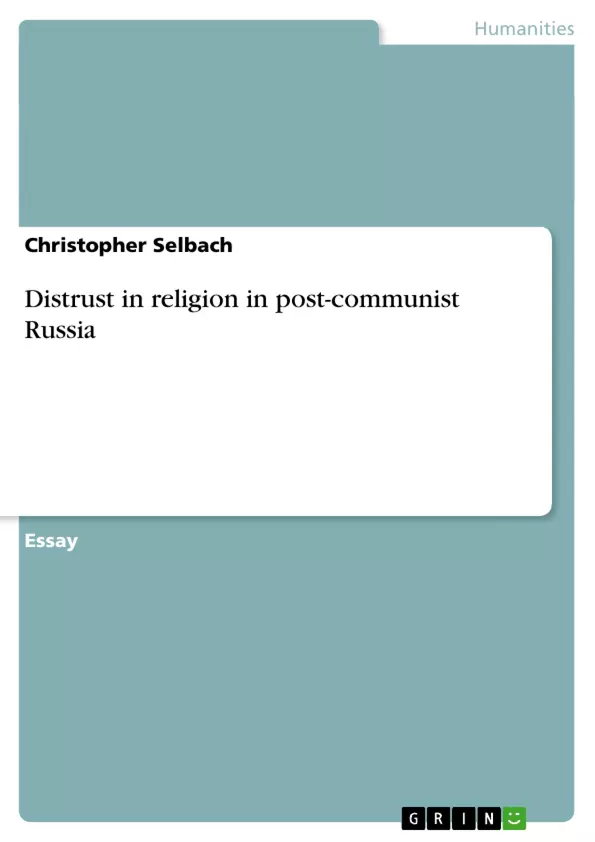The distrust of organised religion is a phenomenon of post-Soviet Russia. It is a likely result of developments that characterise the coming of the modern age as introduced to Russia in its full scale by post-communist liberalisation and pluralisation and is therefore comparable to earlier developments in the West. In Russia the specific experience of atheist totalitarianism as well as its collapse has enhanced several aspects of this "modernity factor" in relation to religious institutions. The essay discusses these and other factors that influenced distrust of organised religion in Russia in the 1990s.
Inhaltsverzeichnis (Table of Contents)
- The basis of theories of modernity
- The development described here can be attributed to Russia
- To show that the distrust of religious institutions in Russia is "modern"
- The second factor is the communist experience and its aftermath
- One of the consequences of the extreme imposition of communist ideology
- Post-communist Russia also saw a revival of national tradition
Zielsetzung und Themenschwerpunkte (Objectives and Key Themes)
This essay explores the factors contributing to deep-seated distrust of organized religion, religious structures, and institutions in post-Soviet Russia. It argues that this phenomenon is not unique to Russia, but rather a product of modernization and its effects on religion.
- The decline of religious institutions in modern society
- The impact of modernization on religious beliefs and practices
- The role of the communist experience in shaping Russian attitudes towards religion
- The rise of religious pluralism and its effects on institutional authority
- The influence of national tradition and popular culture on religious belief.
Zusammenfassung der Kapitel (Chapter Summaries)
- The first chapter outlines the theoretical framework for understanding the decline of religious institutions in modern society, drawing on the work of Peter L. Berger and Thomas Luckmann. It argues that modernization leads to growing social diversity and a divergence between the "official" religious worldview and the experiences of individuals in everyday life. This process contributes to a privatization of belief and a decline in the authority of religious institutions.
- The second chapter examines the applicability of this framework to Russia, highlighting the role of the Russian Orthodox Church and the Soviet experience in shaping Russian attitudes towards religion. It argues that the Soviet regime's suppression of religion and its promotion of a materialistic worldview contributed to a deep-seated distrust of institutions, including religious ones. The collapse of the Soviet Union led to a rapid rise in religious pluralism, which further undermined the authority of established religious institutions.
- The third chapter analyzes the specific characteristics of post-communist Russia that have contributed to the distrust of religious institutions. These include the widespread rejection of holistic explanations of the world, the lingering effects of anti-religious propaganda, and the revival of national traditions that have often been associated with folk beliefs and superstitions.
Schlüsselwörter (Keywords)
This essay focuses on the intersection of religion, modernization, and societal transformation in post-Soviet Russia. Key terms and concepts include religious institutions, secularization, modernization, religious pluralism, communist ideology, national tradition, and the privatization of belief.
Frequently Asked Questions
What are the main reasons for the distrust of organized religion in post-Soviet Russia?
The distrust is attributed to factors of modernization, such as liberalization and pluralization, combined with the specific historical experience of atheist totalitarianism and its subsequent collapse.
How does modernization affect religious institutions according to the essay?
Modernization leads to social diversity and a gap between official religious worldviews and individual daily experiences, resulting in the privatization of belief and a decline in institutional authority.
Which theoretical framework is used to understand the decline of religious institutions?
The essay draws on the theories of modernization and social diversity developed by Peter L. Berger and Thomas Luckmann.
What role did the Soviet regime play in shaping current attitudes toward religion?
The Soviet regime's suppression of religion and promotion of a materialistic worldview created a deep-seated distrust of all institutions, including religious ones.
How did the collapse of the Soviet Union impact religious authority?
The collapse led to a rapid rise in religious pluralism, which further undermined the authority of established institutions like the Russian Orthodox Church.
- Arbeit zitieren
- Christopher Selbach (Autor:in), 2001, Distrust in religion in post-communist Russia, München, GRIN Verlag, https://www.grin.com/document/16468



